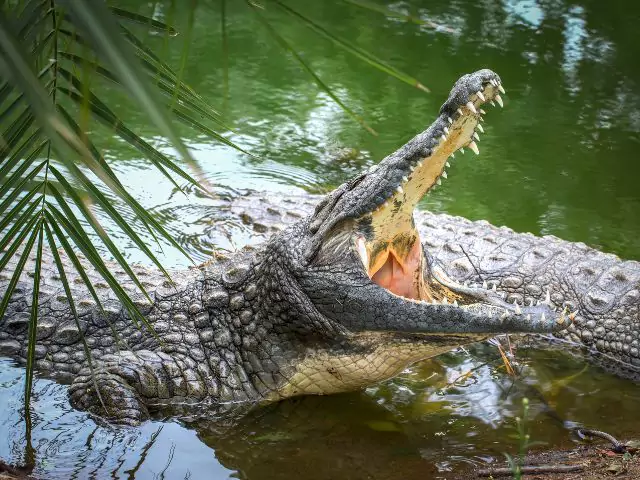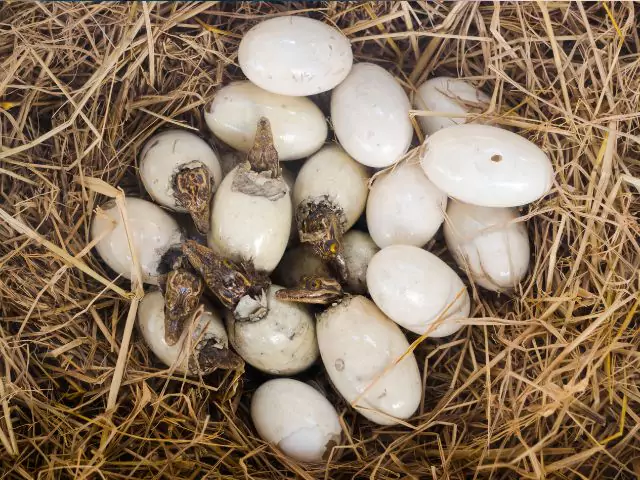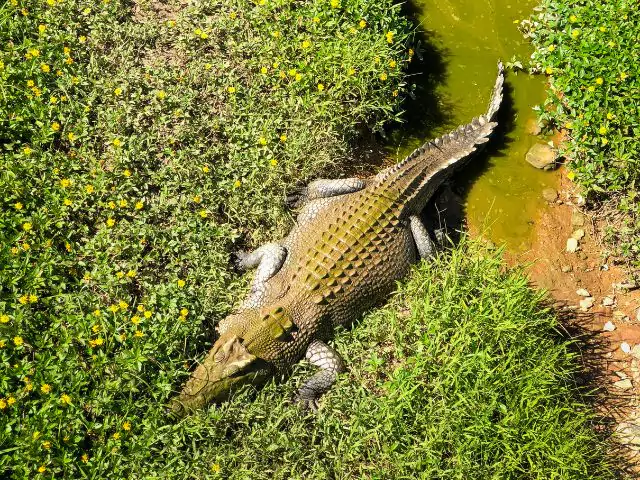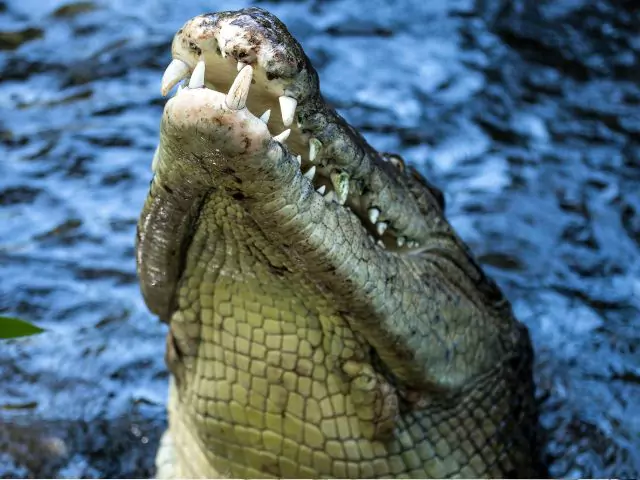Like them or loathe them, crocodiles are fascinating ancient predators that have been feared, revered, and respected by humans since we joined them in existence.
These distinct and dominating reptiles have been a symbol of strength and resilience throughout history, and even hold cultural and mythological significance in some parts of the world.
If you admire these prehistoric predators, we’ve listed some fascinating facts about them for you below. Plus, the reasons why they play a huge role in the health of overall ecosystems and how you can dedicate your career to protecting them.
10 Fascinating Facts About Crocodiles
These unique and striking creatures are fascinating in so many ways. Check out just some of the many interesting facts about them:
1.They Have Ancient Lineage
Crocodiles have a remarkable evolutionary history and are often referred to as living fossils. They have remained relatively unchanged for over 200 million years, making them one of the oldest reptile lineages on Earth.
2.Their Size And Longevity Supersedes Most Species
Crocodiles are known for their impressive size. The largest species, the saltwater crocodile, can reach lengths of up to 20 feet (6 meters) and weigh over 2,000 pounds (907 kilograms). They also have a long lifespan, with some individuals living for more than 70 years.
3.They Have Incredibly Powerful Jaws
Crocodiles have one of the strongest bite forces in the animal kingdom. The muscles that close their jaws are incredibly powerful, allowing them to exert tremendous pressure when capturing prey. Their bite force is estimated to be several thousand pounds per square inch.

4.They Can Regenerate Their Teeth
Crocodiles have a unique tooth replacement system. They have a specialised groove in their jaws that allows new teeth to grow to replace the ones they lose. Over their lifetime, they can grow and replace thousands of teeth.
5.They Have A Sensorineural Organ
On the skin of a crocodile's snout, they have tiny pits called 'integumentary sensory organs'. These pits are sensitive to pressure changes in the water, allowing the crocodile to detect even the smallest disturbances made by potential prey or threats.
6.They Make Excellent Parents
Crocodiles exhibit remarkable parental care. Females build nests and lay eggs, which they guard vigilantly. Once the eggs hatch, the mother carries her offspring to water, protects them, and provides guidance and protection for several months until they become independent.
7.They Are Efficient Swimmers
Despite their large size and seemingly clumsy appearance on land, crocodiles are excellent swimmers. They use their powerful tails to propel themselves through the water and can reach impressive speeds, sometimes exceeding 20 miles per hour (32 kilometres per hour).
8.They Have Adapted For Survival
Crocodiles have several adaptations that make them formidable predators. Their eyes and nostrils are positioned on top of their heads, allowing them to stay partially submerged while observing their surroundings. They also have a valve in their throat that keeps their mouth closed underwater, enabling them to capture prey without swallowing water.
9.They Have Unique Feeding Habits
Crocodiles are opportunistic feeders and have a diverse diet. They primarily consume fish, but they also prey on mammals, birds, and other reptiles. They are known for their 'death roll' technique, where they spin their bodies to tear apart prey or dismember larger animals.
10.They Can Have ‘Virgin Births’
In 2023, Scientists in Costa Rica discovered that crocodiles are capable of self-reproduction, which has only been identified previously in some birds, fish, and other species of reptiles. It’s thought crocodiles, Costa Rican Scientists believe, may have inherited this trait from an evolutionary ancestor.

The Importance of Crocodiles
Not only are crocodiles an incredibly interesting species to study and learn about, but they are also hugely important to other life on Earth.
Crocodiles modify their habitats, such as wetlands and riverbanks, to help support them when nesting and feeding. These modifications create diverse habitats for other species, including birds, fish, and invertebrates. Their burrows also serve as shelters for other animals during droughts or extreme weather conditions.
The way in which crocodiles feed also provides vital nutrients to others in their ecosystem. This is because they consume large amounts of prey, making their excrements rich in nutrients. Crocodiles are also considered to be a keystone species because they have a disproportionate impact on their environment relative to their population size. As top predators, they regulate prey populations and help maintain the balance of the entire food chain.
Another huge benefit of crocodiles is their sensitivity to changes in water quality, habitat degradation, and pollution. Therefore, their presence or absence from an area serves as an indicator of the health of the ecosystem there.
All of these reasons and so many more amplify the need to preserve crocodile populations and their habitats. Sadly, many crocodile species are now classified as threatened or endangered due to habitat loss, poaching, and illegal trade in their skins.

Careers Working With Crocodiles
Today, conservation efforts are in place to protect these fascinating creatures and their ecosystems. This involves many activities like habitat protection, breeding programmes, and sustainable management to ensure their continued survival.
If you’d like to begin a career that works to protect crocodiles, there are several crocodile jobs you can pursue.
- Crocodile Biologist/Researcher – Study the behaviour, ecology, and conservation of crocodiles. In this role, you will conduct research, collect data, and work towards understanding and protecting these reptiles
- Crocodile Handler/Crocodile Park Staff – Work in crocodile parks or zoos handling and caring for crocodiles in captive environments. In this crocodile job, you may be responsible for feeding, cleaning enclosures, providing enrichment, and educating visitors about these creatures
- Crocodile Conservationist – Work to protect and preserve crocodile habitats, promote sustainable practices, and raise awareness about the importance of conserving these animals
- Wildlife Photographer/Videographer – Capture stunning images and footage of crocodiles in their natural habitats to help raise awareness about these animals and their conservation needs
- Crocodile Tour Guide – Lead expeditions or boat tours in crocodile habitats, providing information about crocodile behaviour, habitats, and conservation efforts
- Crocodile Rescue and Rehabilitation Specialist – Work in organisations or sanctuaries that rescue and rehabilitate crocodiles. In this crocodile career, you would rescue injured or orphaned crocodiles, provide medical care, and prepare them for release back into the wild
It's important to note that working with crocodiles can be physically demanding and potentially dangerous. This is why you must study these reptiles in detail and complete any necessary training before starting any of these careers.

Study Crocodiles Online
If you want to work with crocodiles, an excellent place to start is by studying our online Reptile Studies Level 3 Award course.
The course is designed to equip you with in-depth knowledge and understanding of reptiles, including their biology, behaviour, care, and conservation. It covers topics such as reptile anatomy, physiology, husbandry, nutrition, and health. All of which will be highly valuable to you if you are interested in working with reptiles in any capacity.
You'll gain a comprehensive understanding of their unique characteristics, habitats, and ecological roles. The course also covers the threats they face, and the measures required to protect and preserve their populations, so you can contribute to reptile conservation efforts effectively.
What’s more, the course blends online study with practical training as you have the opportunity to work at Crocodiles of the World Zoo. During this optional placement, you’ll work directly with the animal team, preparing food, feeding and cleaning/maintaining enclosures and enclosure areas. All of this and more is an excellent way to experience how a zoo operates, and the fundamentals of animal husbandry for exotic animals.
Find out more about this course now by viewing it here on our website, by discussing the course in more detail with our team online, or on 01202 006 464.
Alternatively, if you’re ready to start a rewarding animal career but don’t know which path to take, click the link to download our FREE animal course brochure below and find the course that suits your goal.



















